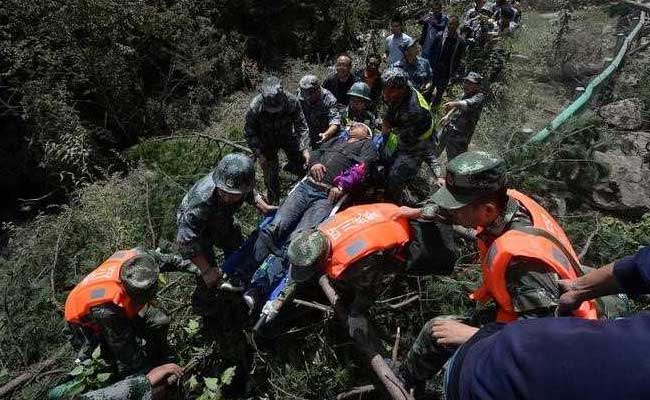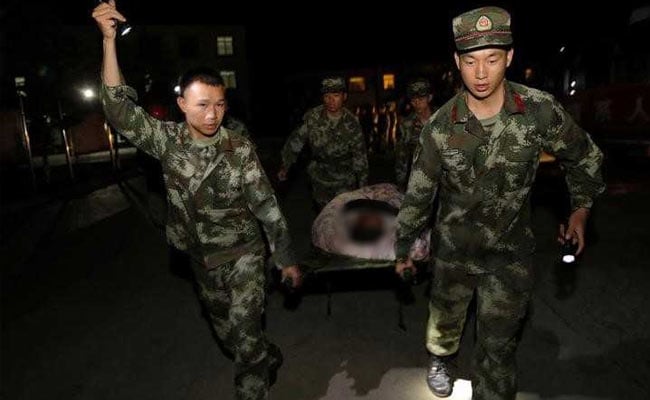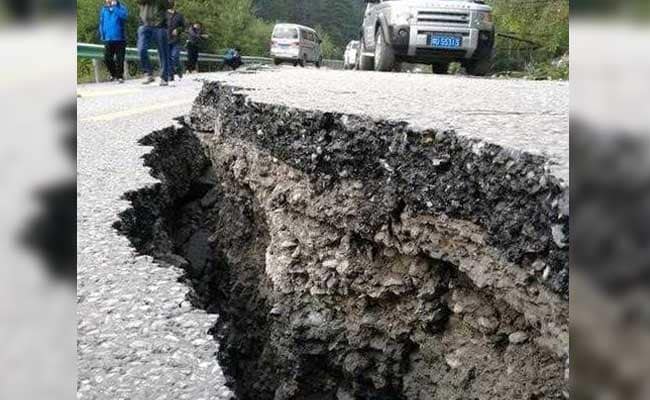
Sichuan province is prone to being hit by earthquakes. (Reuters)
Jiuzhaigou, China:
A 7.0 magnitude earthquake struck a remote, mountainous part of China's southwestern province of Sichuan, killing 19 people, including six tourists, and injuring 247, the provincial government and official media said on Wednesday.
The quake hit a sparsely populated area 200 km (120 miles) northwest of the city of Guangyuan late on Tuesday at a depth of 10 km (6 miles), the U.S. Geological Survey said. It was also close to the Jiuzhaigou nature reserve, a tourist destination.
Sichuan is frequently struck by tremors. A huge quake there in May 2008 killed almost 70,000 people.
A separate quake with a magnitude of 6.6 struck a remote part of China's far northwestern region of Xinjiang, more than 2,000 km (1,240 miles) away, on Wednesday morning, the Chinese earthquake administration said. The People's Daily said 32 people had been injured in the mostly rural area.
 The Sichuan government said rescuers were gradually evacuating tourists and residents who had been cut off by landslides.
The Sichuan government said rescuers were gradually evacuating tourists and residents who had been cut off by landslides.
Six tourists were among those killed, according to the official China News Service.
State television said 19 people had been killed, and that most of those injured were not seriously hurt.
The Sichuan government said that as many as 30,000 tourists had been evacuated from the quake zone, leading to traffic jams on the narrow roads.
 A few dozen tourists were camped out at Jiuzhaigou airport, waiting for flights. The airport was open and beginning to evacuate people by air, state media said.
A few dozen tourists were camped out at Jiuzhaigou airport, waiting for flights. The airport was open and beginning to evacuate people by air, state media said.
A traveller with a young daughter who gave his family name as Li said he was in his hotel when the earthquake hit.
"The walls and floor shook. Some things fell off the table," he said.
Some people were injured in the hotel but most were fine.
"The rescue services showed up quickly and gave us water and things to eat," Li said.
He was given priority to be evacuated as he was with a small child. "At first the road was blocked but they had cleared a lane this morning for ambulances."
A French man and a Canadian woman suffered light injuries, Xinhua reported.
The Sichuan government said earlier fears that part of a hotel had collapsed were overblown, with only relatively minor damage and everyone evacuated safely.
 The Sichuan earthquake administration, which also measured the quake at a magnitude of 7.0, said the epicentre of the tremor was in Ngawa prefecture, which is largely populated by ethnic Tibetans, many of whom are nomadic herders.
The Sichuan earthquake administration, which also measured the quake at a magnitude of 7.0, said the epicentre of the tremor was in Ngawa prefecture, which is largely populated by ethnic Tibetans, many of whom are nomadic herders.
The area was rattled by a number of aftershocks on Wednesday.
Pictures on state-run social media sites showed some damage in Jiuzhaigou, with tiles having fallen from buildings and people gathering outdoors.
State television said electricity had now largely been restored to the affected areas and the military was also sending rescuers to help with relief efforts.
The Sichuan government said on one of its official social media sites that more than 38,000 tourists were currently visiting Jiuzhaigou.
Shaking was felt in the provincial capital, Chengdu, and as far away as Xian, home of the famous terracotta warrior figures, according to the government.
The Xinjiang quake's epicentre was in Jinghe county, about 100 km (60 miles) from the border with Kazakhstan, where about 140,000 people live, according to Xinhua.
Residents several hundred kilometres away in Urumqi, and the cities of Karamay and Yining, felt strong tremors, Xinhua said. The jolt lasted about 20 seconds, it said.
(Except for the headline, this story has not been edited by NDTV staff and is published from a syndicated feed.)
The quake hit a sparsely populated area 200 km (120 miles) northwest of the city of Guangyuan late on Tuesday at a depth of 10 km (6 miles), the U.S. Geological Survey said. It was also close to the Jiuzhaigou nature reserve, a tourist destination.
Sichuan is frequently struck by tremors. A huge quake there in May 2008 killed almost 70,000 people.
A separate quake with a magnitude of 6.6 struck a remote part of China's far northwestern region of Xinjiang, more than 2,000 km (1,240 miles) away, on Wednesday morning, the Chinese earthquake administration said. The People's Daily said 32 people had been injured in the mostly rural area.

The quake hit a sparsely populated area 200km near the Jiuzhaigou nature reserve in Sichuan province.(Reuters)
Six tourists were among those killed, according to the official China News Service.
State television said 19 people had been killed, and that most of those injured were not seriously hurt.
The Sichuan government said that as many as 30,000 tourists had been evacuated from the quake zone, leading to traffic jams on the narrow roads.

The earthquake in Sichuan province killed 19 and injured 247. (Reuters)
A traveller with a young daughter who gave his family name as Li said he was in his hotel when the earthquake hit.
"The walls and floor shook. Some things fell off the table," he said.
Some people were injured in the hotel but most were fine.
"The rescue services showed up quickly and gave us water and things to eat," Li said.
He was given priority to be evacuated as he was with a small child. "At first the road was blocked but they had cleared a lane this morning for ambulances."
A French man and a Canadian woman suffered light injuries, Xinhua reported.
The Sichuan government said earlier fears that part of a hotel had collapsed were overblown, with only relatively minor damage and everyone evacuated safely.

Nearly 30,000 tourists were evacuated from the region. (Reuters)
The area was rattled by a number of aftershocks on Wednesday.
Pictures on state-run social media sites showed some damage in Jiuzhaigou, with tiles having fallen from buildings and people gathering outdoors.
State television said electricity had now largely been restored to the affected areas and the military was also sending rescuers to help with relief efforts.
The Sichuan government said on one of its official social media sites that more than 38,000 tourists were currently visiting Jiuzhaigou.
Shaking was felt in the provincial capital, Chengdu, and as far away as Xian, home of the famous terracotta warrior figures, according to the government.
The Xinjiang quake's epicentre was in Jinghe county, about 100 km (60 miles) from the border with Kazakhstan, where about 140,000 people live, according to Xinhua.
Residents several hundred kilometres away in Urumqi, and the cities of Karamay and Yining, felt strong tremors, Xinhua said. The jolt lasted about 20 seconds, it said.
© Thomson Reuters 2017
(Except for the headline, this story has not been edited by NDTV staff and is published from a syndicated feed.)
Track Latest News Live on NDTV.com and get news updates from India and around the world

